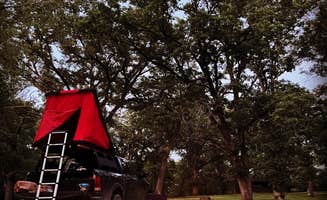Dispersed camping near Evansdale, Iowa offers secluded options in the rolling hills of northeastern Iowa, where campers can experience unstructured outdoor stays along waterways at elevations between 800-900 feet. The region experiences four distinct seasons with humid summers reaching into the 80s and winter temperatures frequently dropping below freezing, making spring and fall popular for primitive camping. Seasonal road closures impact accessibility to some sites, particularly during late fall through early spring when gates may be locked.
What to do
Fishing opportunities: Eagle City County Park provides direct access to the Iowa River with multiple fishing spots. "We go to Eagle City a least once a year to just get away from it all... We have only camped on the lower side to facilitate fishing the river," reports Chantal C., highlighting the park's dual purpose for anglers and campers.
River paddling: The Iowa River adjacent to several dispersed sites supports kayaking and canoeing, particularly during spring and summer months. "Kayakers frequent the river access on the lower side as well as some equestrian use for river access," notes one regular visitor, pointing to the multi-use water access points available.
Wildlife viewing: Early mornings and evenings offer the best chances to spot local wildlife. Wayne H. from Cross Ford River Access mentions, "Had a good 2 weeks here. Some wildlife and lots of bugs but we didn't have a problem with mosquitoes at all," suggesting longer stays allow campers to observe the natural ecosystem.
What campers like
Seclusion factor: Most dispersed sites near Evansdale provide privacy without crowds. Jonathan at Eagle City County Park recounts, "I had the entire campground to myself the night I stayed here. It has well maintained grounds and is right on the water," demonstrating the appeal of solitary camping experiences.
Natural setting: Lake Considine offers a completely undeveloped camping experience beside a fishing lake. According to Chantal C., "There is a nice lake that is great for fishing, there was access for small boats previously (think kayak/canoe)," highlighting the site's natural attractions without developed amenities.
Well-maintained grounds: Despite their primitive status, several sites receive regular maintenance. "Great camping spot! We'll maintain camp sites. I was the only one on grounds," reports Austin A., noting the care taken at Eagle City despite its remote location.
What you should know
Recent fee implementation: Several previously free sites now require payment. Brian notes that at Eagle City Park, "they do now require a permit to stay here. Sites are first come first served with no reservations. Cost is $10 and you can pay up to 30 min after claiming your site."
Limited facilities: Prepare for genuinely primitive conditions at most dispersed sites. Jason K. observes, "First, there is no pit toilet. Second, you need to pay ($10) via a website. Scan the QR code by the entrance. I couldn't get it to work," indicating technology hasn't completely improved the camping experience.
Water reliability issues: Hand pumps, when available, may not function consistently. "Water well isn't working though, only downside," reports Austin A. from a recent stay, suggesting campers should always bring their own water supply regardless of listed amenities.
Tips for camping with families
Site selection for children: Choose locations with level ground and accessible water features. Megan C. from Gates Bridge County Park shares, "Wow! This campground surprised us! Not only is it directly on a river with wildflowers, it has a pit toilet and hand pump water," highlighting features that make primitive camping more manageable with children.
Safety considerations: Some remote areas may feel isolated or unsafe for families. One camper reports, "Liked the spot by the lake and we could have been the only ones there but we noticed a few things on the way to the site that was unsettling and then we were followed in by a truck that just went to the end of the loop then left, with the driver and passenger obviously not wanting to be seen."
Seasonal planning: Time visits to avoid peak insect activity. "Grounds are well maintained but not bug treated, so be prepared," advises Chantal C., suggesting early spring or fall camping might be more comfortable for families with young children.
Tips from RVers
Accessibility assessment: Most dispersed sites accommodate smaller rigs but present challenges for larger vehicles. Caleb S. notes, "It was also easy to find and access even with a low clearance car," while another camper explains, "You could easily park a van here, and probably a small trailer but nothing all that long."
Self-containment requirements: RVers should arrive fully self-sufficient with water and waste management solutions. Without hookups or dump stations, campers at Lake Considine are advised to "bring a camper if you're ok with no hookups," emphasizing the need for complete self-sufficiency.
Seasonal road conditions: Gravel access roads can deteriorate after rain or during spring thaw. Kerry M. notes, "The gates are closed all winter, often into late spring. The roads are not plowed in either campsite," warning RVers about seasonal closures affecting vehicle access.


